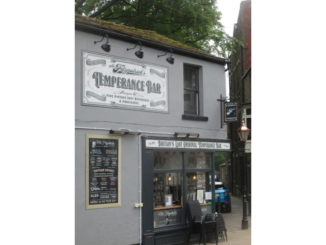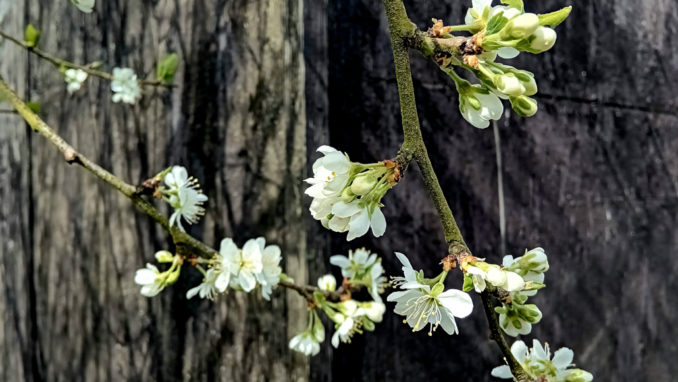
© Colin Cross, Going Postal 2025
My loyal reader may well remember the buildings and maintenance department, at my request, taking the big saw to the plum tree, which at the time was riddled with canker, if an attempt to encourage some new growth. We’d taken advice from Forester Dave as to when would be the best time to undertake such a procedure and we acted upon it, more (I have to admit) in hope than expectation. The weather at the beginning of Spring 2024 wasn’t particularly kind to us up here in the frozen northern hinterlands and what little blossom did appear was soon lost to cold and winds, before any fruit had time to set. This year (so far) it’s been a different story, with fine weather and only slight ground frosts allowing some healthy blossom to form on some healthy looking new growth. The weather’s turned a bit and the fruit hasn’t set yet, but I have some hope for a crop. The Victoria plum tree is thought to originate in England and was first recognised by a chap called Denyer (probably in Suffolk) in the early 19th century, although I’m guessing it’s been around a bit longer than that. It’s a fine fruit, great for eating when just ripe and also, later on in the season, great for jam making. A quintessentially English thing, one might say.
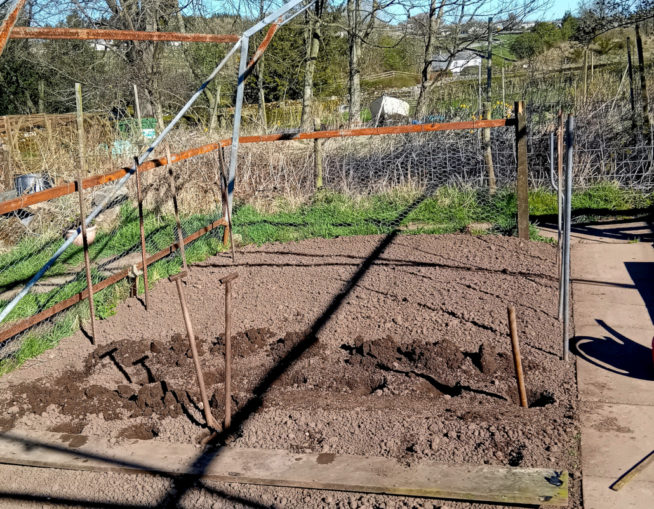
© Colin Cross, Going Postal 2025
Having champed at the bit for several weeks, waiting for the worst of the frosts to pass, I decided it was about time to get some spuds in the ground. As the patch has been well rotovated I didn’t bother making a trench and, instead I used the hole making tool to excavate four rows of holes (28 in total) a foot or so apart and a foot or so deep, planting two stitches of Charlotte and two of Caledonian Pearl. If things follow their expected and natural course, we should be eating freshly dug new potatoes some time in early June. There’s nothing quite like them, IMHO, freshly dug, boiled in their skins until just cooked, and served with butter and salt. Peculiarly English? Quite possibly.
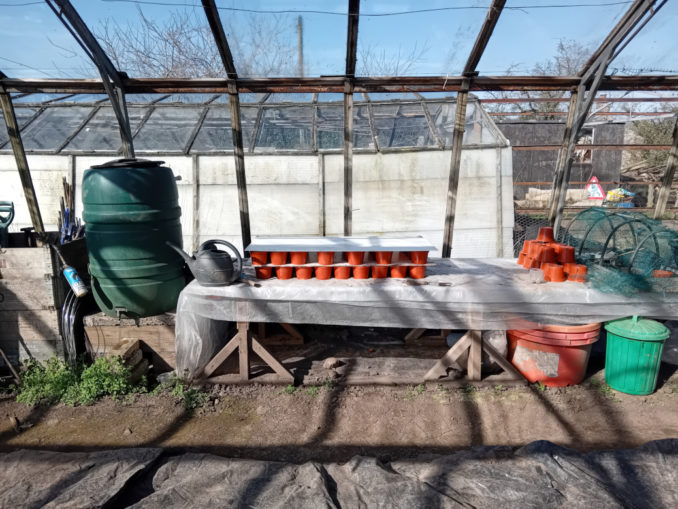
© Colin Cross, Going Postal 2025
Buying “cheap” compost isn’t always the win one might think it is. A simple statement and a lesson that I shouldn’t need to have to keep on learning. I’ve made my own seed compost, by the simple expedient of sieving the older stuff from my own heap into one of the small green bins, kindly donated by Forester Dave when he moved into town and, in the main, it’s done its job, even if somewhat more slowly than I might have like. Against my better judgment (I know) I decided to buy three bags of the new fangled “peat free” stuff (discussed previously, ad infinitum). This also needed sieving, which is fair enough, but £4.50 to end up with only enough to fill forty 4 inch pots is a bit steep. Having said that, I’ve mixed the stuff that wouldn’t go through the 1/4 inch sieve with some chicken manure and used it to bed the seed potatoes. Is being thrifty an English trait, or is it a regional thing?
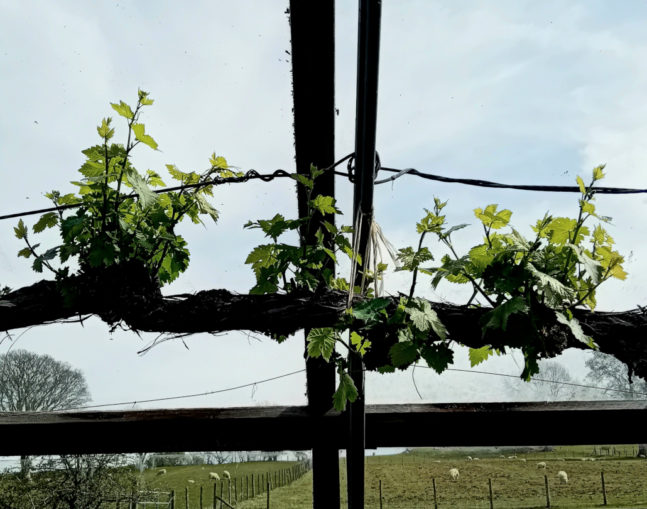
© Colin Cross, Going Postal 2025
A quick look in on the vine, which continues to prosper. Vines and viniculture have been part of the landscape of England since Roman times. Grapevines were once widespread throughout England, although not so much this far north. England was warmer back then, probably due to turbo-charged chariot engines and the like, causing a localised “Klimate Katastrophe”. I can’t claim, as old as it is, that my vine’s descended from the Roman strains, but I’m guessing that’s where its (metaphorical) roots lie. Any road up, it’s English now.
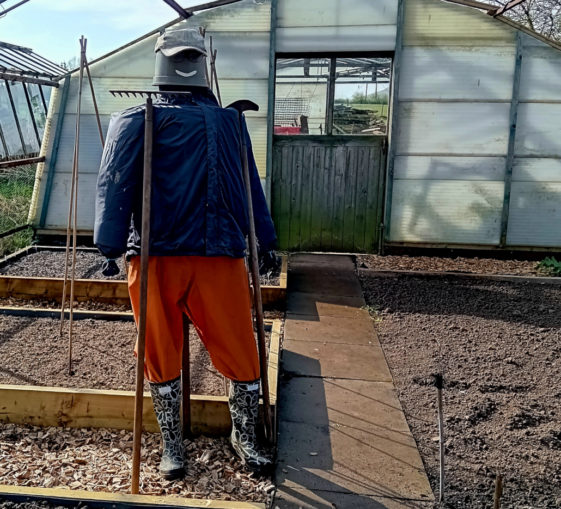
© Colin Cross, Going Postal 2025
Bert has spent his winter hibernation laying on a pallet in the big shed. We did remove his wellies to make him slightly more comfortable and he wasn’t too lonely, given that a family of mice had taken up winter residence in his left sleeve. They’ve moved on now and Bert’s returned to his rightful place in the hierarchy where he performs a double function. He scares birds and he minds some of the long handled tools when they’re not in use. Scarecrows have been part of the global agricultural landscape for millennia but it wasn’t until the Middle Ages that the tradition of stuffing old clothes with straw and the like to approximate a human figure was adopted in England. Prior to this, children had been “employed” to throw stones at crows. I suppose it kept them out of bother! Bert’s clearly as English as you or me, he has no sense of style and he looks like he got kitted out in a paint factory. This last week he are mostly been holding a hoe and a rake and protecting the bean canes.
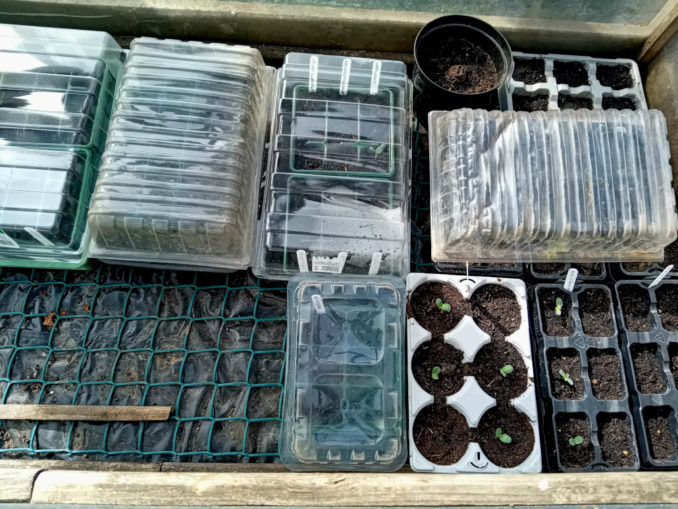
© Colin Cross, Going Postal 2025
Sunflowers, broad beans, runner beans, french beans, aubergines, peppers and chilies are all in the cold frame where germination is slow but evident (in some cases). I’d hoped for quicker and better results, but I’ve now taken to trying to hold some of the heat and moisture in, in an effort to speed up the process. I’m eager to get to next stages but, as we all should know, nature won’t be hurried along unless it wants to be. I don’t feel I’ve really started the season until the cold frame’s loaded out with 4 inch pots of healthy seedlings and the hoops for the fleece cover are in place. I blame the vagaries of the English weather.
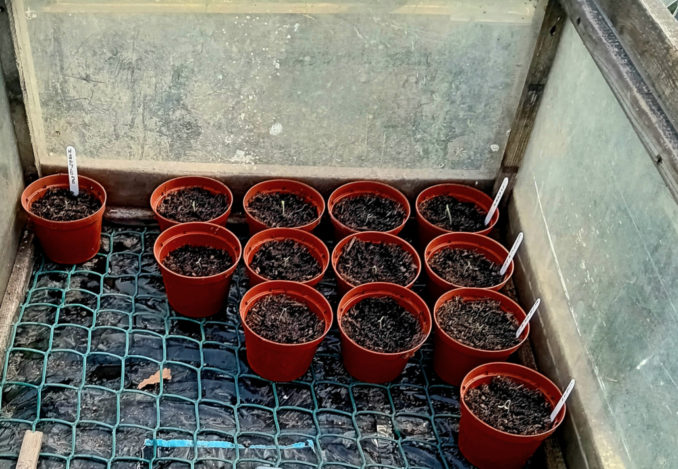
© Colin Cross, Going Postal 2025
I had potted on some tomatoes, 13 to be precise, but only ten of them have survived, although the ones that are left do seem to be doing well. I have another half dozen germinated and 36 more still in the heated trays. A friend who dabbles in hydroponics has taken some seed to try and get it started for me, so I could end up with a healthy number of plants and spares. I think I’ll return to the tried and tested next year though. Airing cupboard to germinate, followed by south facing bedroom windowsill to harden off. I’ve been a bit too clever for my own good this time around, but, being English, I shall gird my loins and try very hard to learn from my mistakes (eventually).
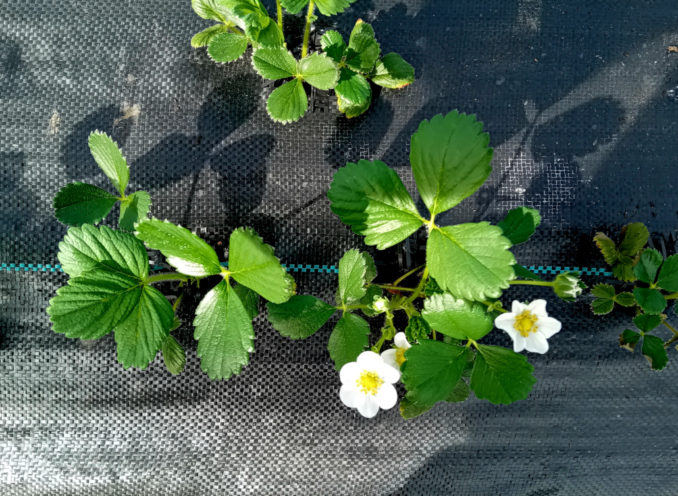
© Colin Cross, Going Postal 2025
As good as the strawberries look, there are thirteen that have either died back, or aren’t doing as well as I would like, so I’ve ordered some replacements, which should be here this week. It’ll do no harm to put some fresh stock in, something I haven’t done for maybe three years now, having relied on nursing a mix of the better looking plants and some runners through the winter and replanting them in the beds as soon as I felt it the right time. England has its own strawberry history, with small woodland fruits first known to have been transplanted into gardens from the Middle Ages, although the majority of the ones we cultivate today are hybrids of South American fruits, which were first brought to Europe in around 1750. As with the new potatoes, there’s little to compare with the taste and succulence of those first, freshly picked, English fruits.
I’m English, I was born in England, of English parents, and I can trace my lineage back thirteen generations on my fathers side of the family. I’m proud to live in England too, although I know I’m very lucky to live in a corner of this great country that can still, in all honesty and just about, call itself truly England. What’s my point, you might ask? It’s this, English-ness (as I see it) is being hollowed out. The demographics of our towns, cities and some of our larger villages, once a mix of predominantly English people with a smattering of folk from other nations, including those not indigenous to this country or its close neighbours, are changing increasingly rapidly and with these changes has come a diluting of those things that once made our culture and our way of life reasonably (if not totally) unique. Once renowned and almost universally defined, worldwide, for our fairness, our personal industry, our love of free speech and the personal responsibility we take to know the boundaries, our belief in fair play, our sense of civic pride, our selflessness when our neigbours are in trouble, our bravery in times of hard challenges, our willingness to abide by good and sensible law and our resolve when attempting to get bad law repealed, our stoicism in the face of threat, our pragmatism in making decisions and (perhaps most importantly) our ability to take the hard knocks of life, keep our emotions in check and never be over emotive when things go a bit awry. We’re now looked upon as almost a bastardised people who’ve almost become second class citizens in their own country.
The things I’ve listed (far from exhaustive) were once, and not that many years ago, valued by ordinary Englishmen men and women as being both the hallmarks and the cornerstones of a functioning society, but, in far too many cases, weak and easily fooled people, dazzled by “modern” life, have stopped seeing these traits as positives. In some cases we’re our own worst enemies, but we can’t take all the blame. For whatever reason, the British political establishment and its confederates in the media have taken it upon themselves to create (and support) a world which makes us reliant on “the system” at the expense of being reliant on ourselves. Maybe it has something to do with the EU and the abrogation of decision making to a corrupted outside authority, but that’s probably a debate for another day. Those of us who’ve fully fallen for this gambit, the “Free Palestine” crowd, the permanently “put upon”, the “Progressive” do-gooders with too much time on their hands, the porn addled degenerates larping as something they can never be, the benefit dependent feckless with their fake illnesses and the idle workshy do neither themselves nor the rest of us any favours. They’ve fallen into the trap and will continue to welcome those things which will hasten their own demise, as the rest of us look on in disbelief at just how easy it’s all been and just how quickly it’s all happened. These are the very same English people who believe that we can stop glaciers melting in Ecuador by the simple expedient of importing Chinese coal from Japan, to power blast furnaces in Scunthorpe, that I’m “far-right” for not buying into all the old bollox, and that a piece of paper can change a person from being a man into being a woman. I call them the “ideologically blind” and I’m glad I’m not one of them.
© Colin Cross 2025


